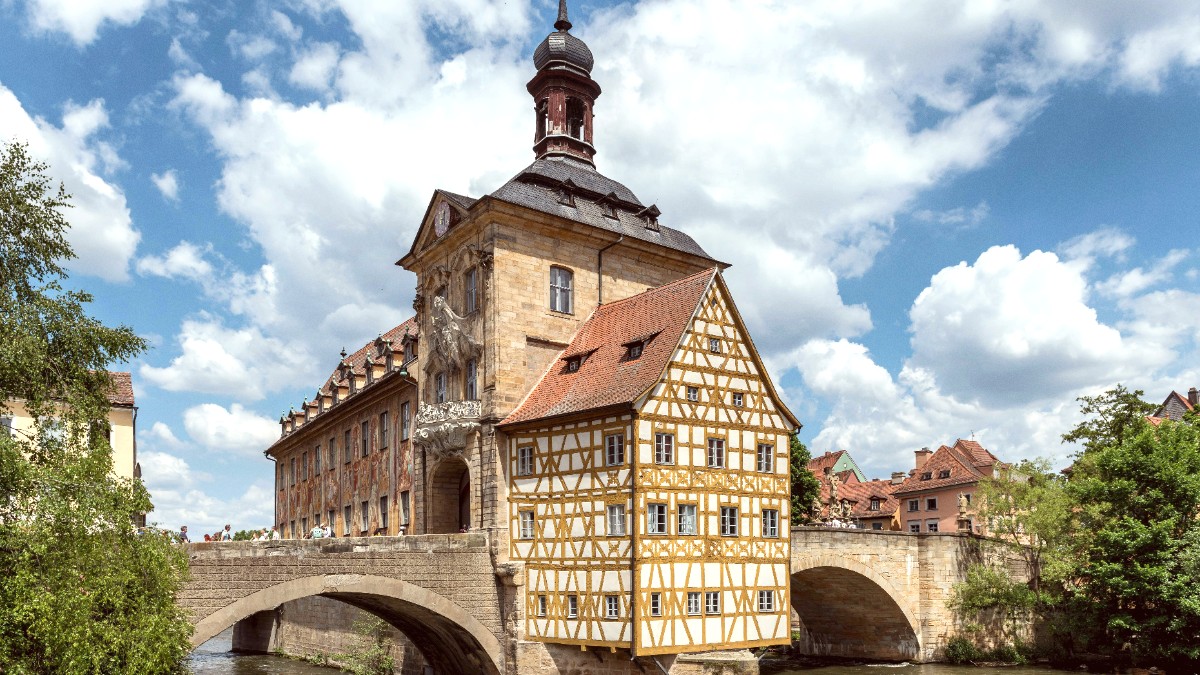
Bavaria, Germany
Germany's main mobile providers are Telekom (D1), Vodafone (D2), and O2 (Telefonica). Telekom often presents the widest coverage. Prepaid SIMs are available at mobile phone shops, large supermarkets, or post offices. Activation requires passport presentation (Legitimierung).
Most hotels in Bamberg extend complimentary Wi-Fi access. Many cafes, restaurants, and brewery inns also extend free Wi-Fi for customers; look for signs or inquire with staff. Widespread public Wi-Fi is limited beyond specific hotspots. A local SIM or eSIM for mobile data is the most reliable way to stay connected while moving about.
Deutsche Post operates as Germany's national postal service. Yellow post boxes and offices identify its services. Stamps are available at post offices or some newsstands (Zeitschriftenläden). Postcards and parcels find dispatch from any post office location.
German is the official language. English finds wide use in tourist-oriented businesses. Many younger Germans also speak English. Learning a few German phrases enriches your experience and is appreciated by locals. Translation apps are invaluable tools.
Learning even a few basic German phrases will greatly enrich your travel experience and show respect to local residents.
Typical operating hours for businesses, banking services, and holiday considerations.
Monday-Friday: 9:00/10:00 AM - 6:00/8:00 PM. Saturday: 9:00/10:00 AM - 4:00/6:00 PM. Most shops close on Sunday. Grocery stores generally operate until 8:00 PM or 10:00 PM on weekdays.
Lunch service: 12:00 PM - 2:00/3:00 PM. Dinner service: 6:00 PM - 9:00/10:00 PM. Some brewery inns offer continuous service. Cafes generally open morning until late afternoon or early evening.
Traditional bank branches open Monday-Friday, 9:00 AM - 4:00/5:00 PM, often with a lunch break. Limited or no Saturday hours. ATMs (Geldautomaten) are widely available 24/7 at bank branches, shopping centers, and train stations, accepting international cards.
Germany observes several public holidays, with Bavaria having additional ones. Most shops, banks, and businesses close on public holidays. Public transport may run on a reduced schedule. Always check a local calendar for specific dates when planning your trip.
Some smaller attractions, guesthouses, or restaurants, especially those catering to seasonal tourism, might feature reduced hours or close for a period during the low season (e.g., January/February). It is always wise to confirm individual websites or call ahead for specific opening times during these periods.
Most shops close on Sundays in Germany due to "Ladenschlussgesetz" (shop closing law). Plan your shopping for weekdays or Saturdays.
Cultural awareness enriches your journey in Bamberg. Observe local customs for a welcoming experience.
A firm handshake is common when meeting someone new or in formal settings. Use "Sie" (the formal 'you') when addressing strangers, older individuals, or in professional contexts. Wait for them to offer "Du" (the informal 'you') before using it. A simple "Hallo" or "Guten Tag" is a fine greeting. In Bavaria, "Grüß Gott" is a common, traditional greeting.
Neat casual attire is acceptable throughout Bamberg. For visiting churches, modest dress (shoulders and knees covered) is respectful. Germans often dress practically for the weather and for walking, so comfortable and sensible clothing is often a good choice over overly formal or flashy attire.
Any display or discussion of Nazi symbols, ideology, or salutes is illegal and highly offensive in Germany. Avoid all references. Punctuality is valued; be on time for appointments or notify if running late. Germans generally follow rules strictly (e.g., pedestrian signals, recycling guidelines). Adhering to these demonstrates respect. Direct communication over extensive small talk is common with strangers.
Germany is a progressive and inclusive country. LGBTQ+ rights are protected by law, and acceptance is generally high, specifically in urban areas like Bamberg. Travelers can expect a welcoming environment without specific safety concerns related to gender identity or sexual orientation.
These small considerations contribute to a harmonious visit.
Germany presents a commitment to improving accessibility for travelers with mobility challenges. However, historic cities like Bamberg may pose unique hurdles.
Newer public buses in Bamberg typically feature low-floor designs and ramps, catering to wheelchairs and strollers. Regional trains generally present accessible carriages. While many pavements maintain good condition, Bamberg's Old Town has extensive cobbled streets. These can be challenging for manual wheelchairs, electric scooters, or those with walking difficulties.
Many larger museums and newer public buildings offer ramps, lifts, and accessible restrooms. Historic buildings like Bamberg Cathedral or the Old Town Hall may exhibit limited accessibility in certain areas due to their age and structure. It is advisable to check individual attraction websites for specific accessibility information or contact them directly before your visit. Consider using taxis for transport if navigating cobbled streets or hills presents a challenge.
Some public transport apps include audio announcements for stops. Major institutions and museums may extend audio guides. For travelers with hearing impairments, inquire about sign language tours or written transcripts upon request. Planning ahead with these resources can enhance your experience.
General German accessibility guides exist from national tourism boards or organizations dedicated to accessible travel. The official Bamberg Tourist Information office (en.bamberg.info) serves as a valuable resource for specific details on accessible routes, attractions, and services within the city. They can share local insights and direct you to pertinent resources.
Use online map tools that show street views.
Pinpoint areas with steep hills or extensive cobblestones.
Map out accessible paths for your journey.